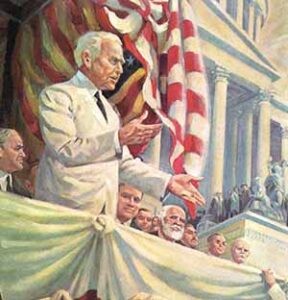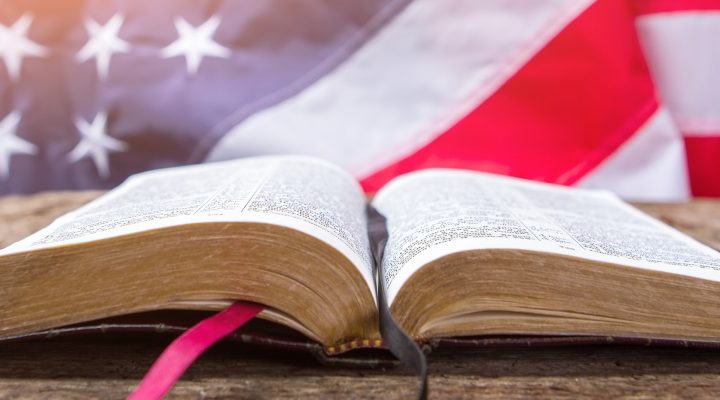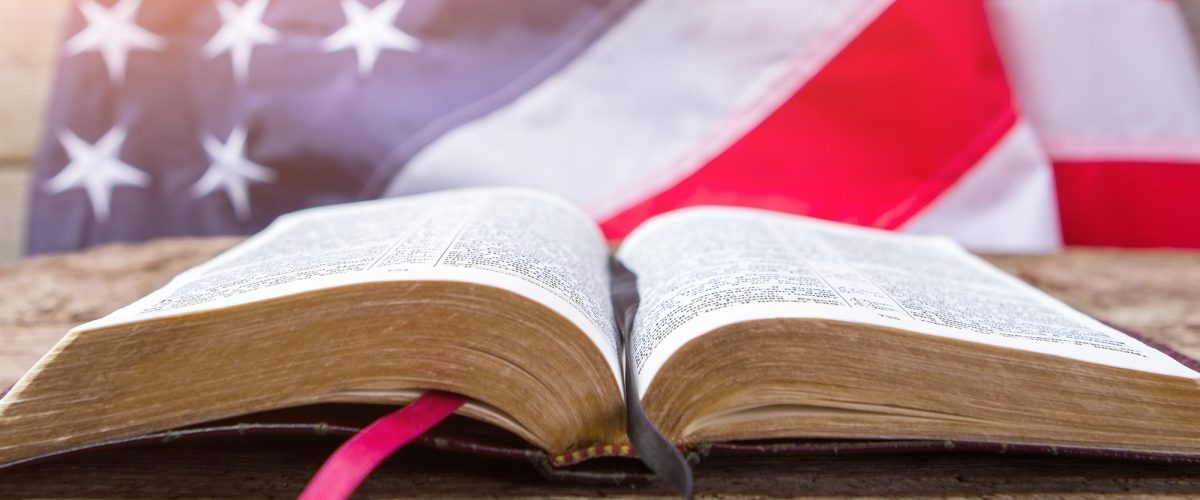As Christian nationalism forces itself across the American political and ecclesiastical landscape, I’ve been intrigued by recent columns from David French, New York Times commentator and prominent evangelical Christian. These include “Who Truly Threatens the Church?” (July 10), “Political Christianity Has Claws,” (Aug. 26), and “One Reason the Trump Fever Won’t Break” (Oct. 2).
In the July 10 essay, French wrote: “Arguments for a ‘Christian nationalism’ are increasingly prominent, with factions ranging from Catholic integralists (anti-liberals) to Reformed (Calvinist) Protestants to prophetic Pentecostals all seeking a new American social compact, one that explicitly puts Christians in charge.”
Yet in his Oct. 2 column, French cites Midwestern Baptist Seminary history professor Thomas Kidd, who labels those religionists characterizing “intellectual or theological Christian nationalism,” as distinguished from “actual Christian nationalism” which “is more a visceral reaction than a rationally chosen stance.”
French believes the latter description is more consistent with “Christian MAGA America,” a crowd that believes “the fate of the church” is inseparable from Donald Trump, “the once and future president of the Unites States.” For them, French says, “Christian opposition to Trump is often seen as a grave betrayal of Christ himself.”

Bill Leonard
Kidd and Thomas apparently believe theology has little or nothing to do with it.
I beg to differ. While I appreciate the nuanced descriptions, I believe both subgroups represent elements of an “actual Christian nationalism,” with each advocating a particular kind of American/Christian religious establishment, one grounded in fundamentalist orthodoxy, the other in fundamentalist Trumpism. While ideologically distinct at certain points, their collective goal is to put a form of Christianized authoritarianism “in charge” in America.
In Revive Us Again: The Reawakening of American Fundamentalism, Wheaton University’s Joel Carpenter identifies “characteristic beliefs and concerns” of Protestant fundamentalism including “an intense focus on evangelism as the church’s overwhelming priority, the need for a fresh infilling of the Holy Spirit after conversion in order to live a holy and effective life, the imminent, premillennial second coming of Christ, and the divine inspiration and absolute authority of the Bible, whose very words were free from errors (inerrant).”
Carpenter notes what “distinguished fundamentalists from other evangelical or conservative Protestants (was) their determination to resist modern secularity on an ideological, argumentative level. Militancy was the mark of fundamentalism and ideological militancy especially.”
In her voluminous, insightful study, The Evangelicals, the Struggle to Shape America, Francis Fitzgerald writes that by the 1940s conservative Protestants divided into “two parties,” one that was more “separatist, militant and often politically extreme;” and another “bent on regaining respectability and cultural influence, preferring to be called ‘evangelical’ as opposed to ‘fundamentalist.’”
However, both groups never were “completely distinct” since both had roots in the infamous fundamentalist-modernist battles of the early 1900s. Notre Dame historian George Marsden summed it up like this: “A fundamentalist is an evangelical who is mad about something.” Truer words were never spoken.
“Fundamentalism comes home to roost in Christian nationalism.”
Fundamentalism comes home to roost in Christian nationalism. Many Trumpian fundamentalists use the language of Christianity, but with a hermeneutic that replaces biblical inerrancy with the inerrancy of Donald Trump. An August CBS poll asked Trump voters to rank those about whom “you feel what they tell you is true.” Trump topped the list at 71%, with 63% going to friends and family, 56% to conservative media figures, 42% to religious leaders.
Let us pray.
Robert Jeffress, Trump-affirming pastor of First Baptist Church of Dallas, illustrates that ill-formed fundamentalist hermeneutic. As BNG reported, “Jeffress publicly defended Trump’s ‘hush money’ payments by inventing an 11th Commandment just for Trump: “Evangelicals still believe in the commandment: Thou shalt not have sex with a porn star,” he said. “However, whether this president violated that commandment or not is totally irrelevant to our support of him,” thereby bidding biblical inerrancy a fond farewell.
Trumpian and Pentecostal fundamentalisms intermingle in the New Apostolic Reformation, a network of prophets and apostles formed in the 1990s by former Fuller Seminary professor C. Peter Wagner and others as a way of rekindling religious enthusiasm in the global church. A Religion Dispatches article from Jan. 6, 2023, observes that this new generation of prophets are thought to work miracles through “a supernaturalized spirituality” with a prophetic message “coming directly from the mouth of God.” In other words, the written inerrancy of Scripture is not enough and requires living “prophets” whose revelatory pronouncements come straight from God.
The article continues, “These ideas and the deep theological commitments of the NAR to influencing local and national politics puts much of the movement on the most militant end of the spectrum of Christian nationalism.” Their “dominionism” urges Christians to claim dominance over the “seven mountains” of American culture — religion, family, education, government, media, arts & entertainment and business.
“Had private school vouchers been proposed in the Texas of my youth, … those who taught me would have rushed to the state Capitol (probably with pitchforks) in protest.”
The NAR representatives of “Christian MAGA America” apparently reflect a more “intellectual or theological” Christian nationalism than David French and Thomas Kidd perceive. Likewise, Texas fundamentalists, many elected to the state legislature, reflect a blend of theological and MAGA Christian nationalism in efforts to establish vouchers for private schools and replace public school counselors with Christian ministers. In fact, the legislators are meeting right now in a special session aimed at school vouchers.
An NBC News report, Nov. 6, 2022, asserts: “The push for private school vouchers has been funded in large part by Defend Texas Liberty, a Christian nationalist-aligned political action committee led by a former far-right Republican state lawmaker and bankrolled by a pair of West Texas billionaires.” Their belief is “Texas state government should be guided by biblical values and run exclusively by evangelical Christians.”
Had private school vouchers been proposed in the Texas of my youth, I have little doubt that Baptists, at least those who taught me, would have rushed to the state Capitol (probably with pitchforks) in protest.

Edwin Hearne’s painting of George W. Truett delivering his 1920 address “Baptists and Religious Liberty” is part of the Eight Great Moments in Baptist History series. (SBHLA Image)
Once again, these actions and ideologies, whether “intellectual and theological” or “Christian MAGA,” intersect to create the “actual Christian nationalism” that is a threat to both church and state by installing not just Christianity, but a fundamentalized Christian religio-cultural establishment, reducing religious freedom to “mere toleration,” as George W. Truett, another pastor of First Baptist Church of Dallas, described it in 1920.
Speaking on the steps of the U.S. Capitol, Truett declared:
Toleration is a concession, while liberty is a right. Toleration is a matter of expediency, while liberty is a matter of principle. Toleration is a gift from man, while liberty is a gift from God. It is the consistent and insistent contention of our Baptist people, always and everywhere, that religion must be forever voluntary and uncoerced, and that it is not the prerogative of any power, whether civil or ecclesiastical, to compel men to conform to any religious creed or form of worship, or to pay taxes for the support of a religious organization to which they do not believe. God wants free worshippers and no other kind…***
Toward the end of his historic address, Truett reached his rhetorical apex, insisting, “Never, anywhere, in any clime, has a true Baptist been willing, for one minute, for the union of church and state, never for a moment.”
One hundred three years later, I’m compelled to respond, not until now, Dr. Truett, not until now.
Bill Leonard is founding dean and the James and Marilyn Dunn professor of Baptist studies and church history emeritus at Wake Forest University School of Divinity in Winston-Salem, N.C. He is the author or editor of 25 books. A native Texan, he lives in Winston-Salem with his wife, Candyce, and their daughter, Stephanie.


